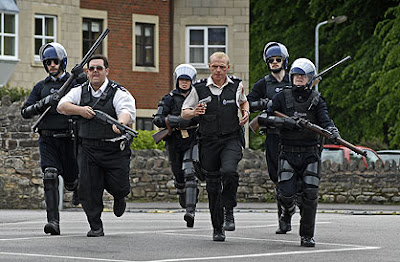Director Edgar Wright recently said that he and writing partner Simon Pegg revealed the title of their new film Hot Fuzz too early. The script had yet to be written but already the internet was clamoring for a buddy cop film from the creators of Shaun of the Dead (and the amazing BBC sitcom Spaced). He said he felt pressured to deliver this unrealized film and almost abandoned the idea. Thankfully he didn’t. Hot Fuzz delivers on all of the hype and promise built up around the fantastically silly title.

At a recent advance screening Wright described the mood of Hot Fuzz as “Agatha Christie being ridden roughly from behind by Michael Bay.” The film does for police action films what Shaun of the Dead did for zombie flicks and romantic comedies; parodying the source material while simultaneously glorifying and reveling in a deep love for it. Hot Fuzz is equal parts comedy and action flick and neither characteristic falls short of the mark.
The film begins with a montage describing Sergeant Nicholas Angel (Simon Pegg) as a by the book, zero tolerance, London super cop. He is so good that he makes the rest of the force look bad in comparison, so his superiors (Bill Nighy, Martin Freeman, and Steve Coogan in the first of many cameos by some of England’s top comedic actors) transfer him to the sleepy country village of Sanford to get him out of the way. There he is partnered with Danny Butterman (Nick Frost, also of Shaun of the Dead and Spaced), the bumbling son of the local police chief (Jim Broadbent), and meets the rest of Sanford’s finest. The local police force is completely inactive and totally ambivalent to minor infractions like underage drinking and public urination. He immediately shakes things up and ends up arresting half the town on his first night only to be stymied by the chief’s insistence that a good talking to and maybe some ice cream can solve any problem.
Sanford’s police force is a jumble of great characters but the highlight of Angel’s new colleagues are the Andys (played by Paddy Considine and Rafe Spall), a pair of inspectors who live to antagonize Angel and Danny with juvenile taunts and practical jokes. The mustachioed pair steal every scene they’re in and provide some great comedic interactions with our heroes. Sanford is also populated with a large cast made up of some great genre icons like Billie Whitelaw (The Omen), Edward Woodward (The Wicker Man), Paul Freeman (Raiders of the Lost Ark), and the amazing Timothy Dalton. Dalton plays the overly sinister supermarket owner and is terrifically funny in all of his scenes.
From here the film follows typical buddy cop formula as Angel and Danny learn to work together and become friends while trying to decipher the mysterious deaths of some of the village’s prominent citizens. While the mystery and action pieces are more than effective, this journey from ill suited partners to good friends is the real heart of the movie. The characters are up there with all those iconic duos we all know and love: Riggs and Murtaugh, Tango & Cash, Die Hard and Carl Winslow. Danny is obsessed with the very action movies Hot Fuzz pays tribute to (especially Point Break and Bad Boys II and many of the movie’s homages come from these two films) and his idea of police work is firmly imbedded in their world. He shows Angel that sometimes the rules need to be broken.
If there is one thing Hot Fuzz has going for it before its release, it’s hype. Shaun of the Dead was an instant cult classic in every way and its rabid fan base has been clamoring for its follow-up. I always get nervous when expectations get this high. I can safely say, however, that Hot Fuzz not only meets the expectations, it surpasses them. I’m going out on a limb here (and I should probably wait till I’ve seen it again to make such audacious claims) but Wright, Pegg, and Frost just might have one-upped themselves. We’ll see.




